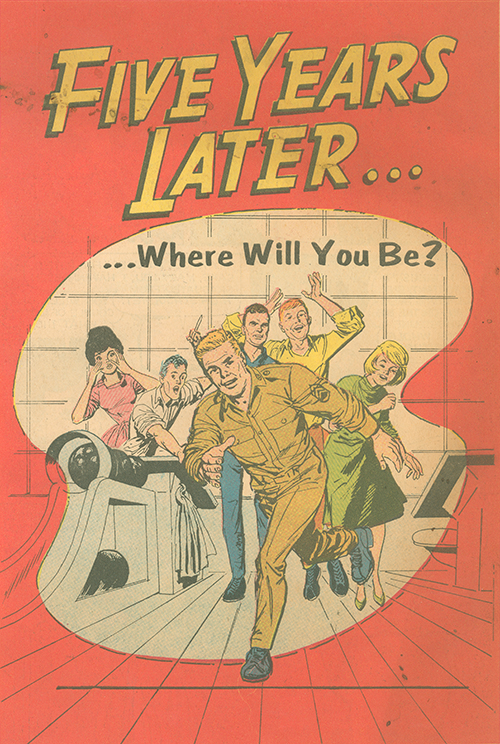The publication Five Years Later is a 1962 Army recruitment comic that is heavily invested in the masculine Be a Big Wheel concept. The comic primarily expresses this through the protagonist, Bud, who uses the Army to ensure a secure financial future, and wins back his girlfriend, Mary Lou, in the process. At the beginning of the comic, Bud is seen as immature, and is unsure of his future. This uncertainty is causing problems with Mary Lou. Bud speaks with Jack, his older brother, and his friends, who help him make some serious decisions about his financial future. They all share their stories with Bud. Then men are seen as mature and developed role models, although one had not been very successful, and was using the military to get back on track. Three of the four men served in the military, and the other is about to leave for training.
Bud’s ability to win over Mary Lou is heavily contingent upon his ability to be a breadwinner. His ability to establish a career is an important component of this, and plays into his worthiness as a romantic suitor. Mary Lou, became very upset with Bud’s indecisiveness, especially regarding his plans after graduation and their future together.[^] Mary Lou tells Bud he’s not half grown up yet because of this indecisiveness, and makes more remarks later on, contrasting Bud’s indecisiveness with the way a secret agent in the film ”…made things happen.”[^] Mary Lou tells him she wants to go straight home, where she tells him not to call her until he’s changed his attitude.[^] Mary Lou’s frustrations with Bud clearly threaten their relationship, and all revolve around Bud’s inability to make decisions or “make things happen.” This kind of language make it clear that he their relationship is on the rocks over his shortcomings as a mature male who can make decisions and has some degree of financial security. After Bud speaks with his brother and his brother’s friends about their military service, Bud proudly tells Mary Lou that he plains to gain an income and training in the military, and find a job from there.[^] Building on this, he then proposes to her.[^] Here it is clearly illustrated that military service, and the financial security it brings, is a tool that can be used to gain and retain the commitment of young women.
One of the most striking examples of this comic’s treatment of military romantic and sexual appeal is the cover art chosen to go with the comic. Although the story revolves around Bud’s relationship with Mary Lou, and his decision to join the military, the front cover features Jack, in full military uniform, bowling. Everyone else is watching excitedly, and Jack is the center of attention. Even more curiously, Bud is not pictured, and Mary Lou and another female (who never appears elsewhere in the comic) are pictured watching Jack bowl. The cover art is instead a picture that situates Jack as the alpha male, and is only tangentially (and partially fictionally) related to the story. This cover image puts the adoration many have for men in uniform front and center, even though the scene has little to do with the content of the comic.
Related Sections
- Be a Big Wheel
- Be a Big Wheel - Sexual Appeal and Adoration
- Be a Big Wheel - Sexual Appeal and Adoration - Dick Wingate in the US Navy
- Be a Big Wheel - Sexual Appeal and Adoration - Foxhole on Your Front Lawn
- Be a Big Wheel - Sexual Appeal and Adoration - Judy Joins the Waves/a>
- Be a Big Wheel - Sexual Appeal and Adoration - Leatherhead in Korea
- Be a Big Wheel - Sexual Appeal and Adoration - Time of Decision
- Be a Big Wheel - Athletic & Physical Prowess - Five Years Later..>Where Will You Be?
- Be a Bigwheel - Breadwinner - Five Years Later...Where Will You Be?
Primary Sources



